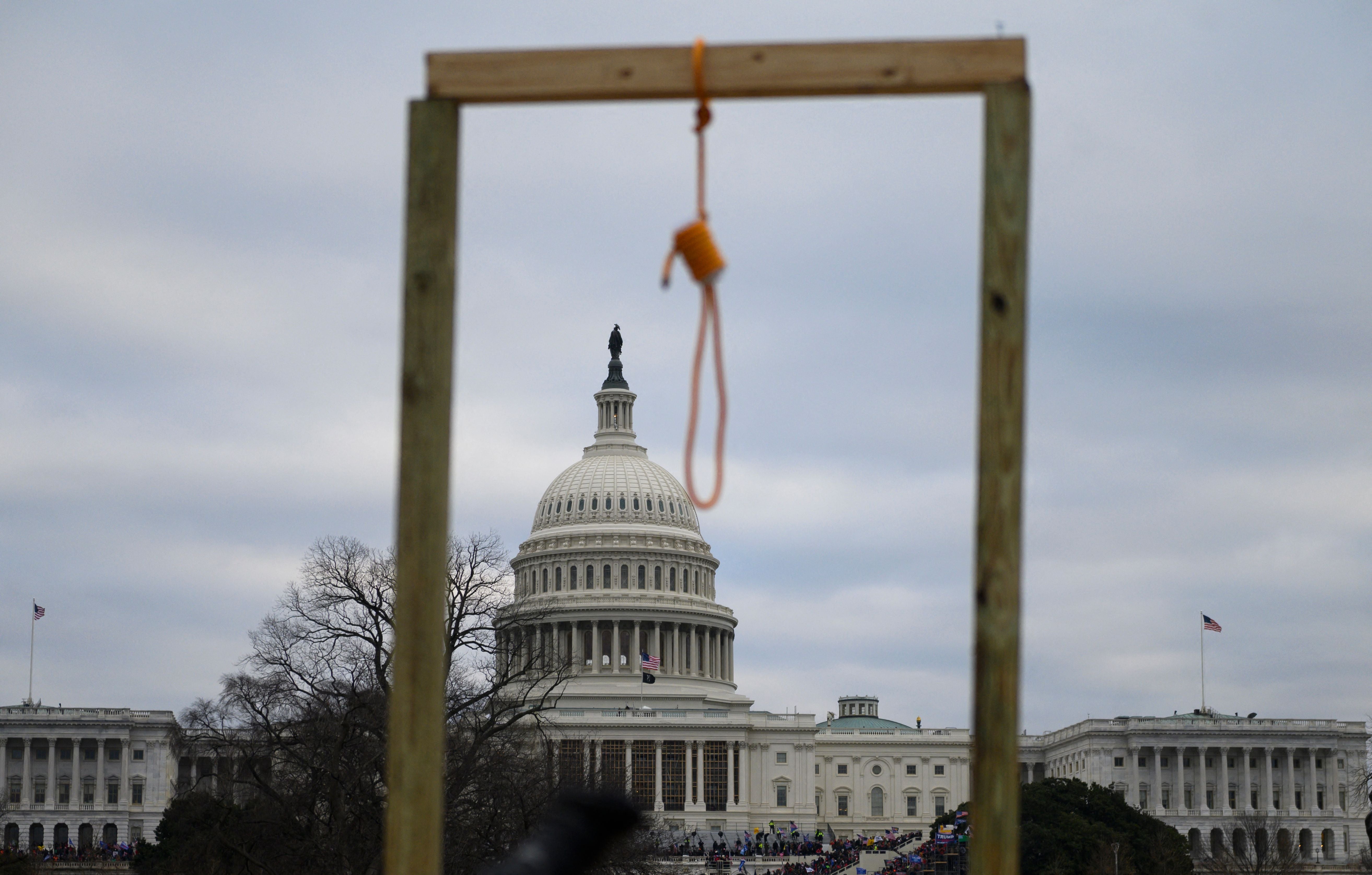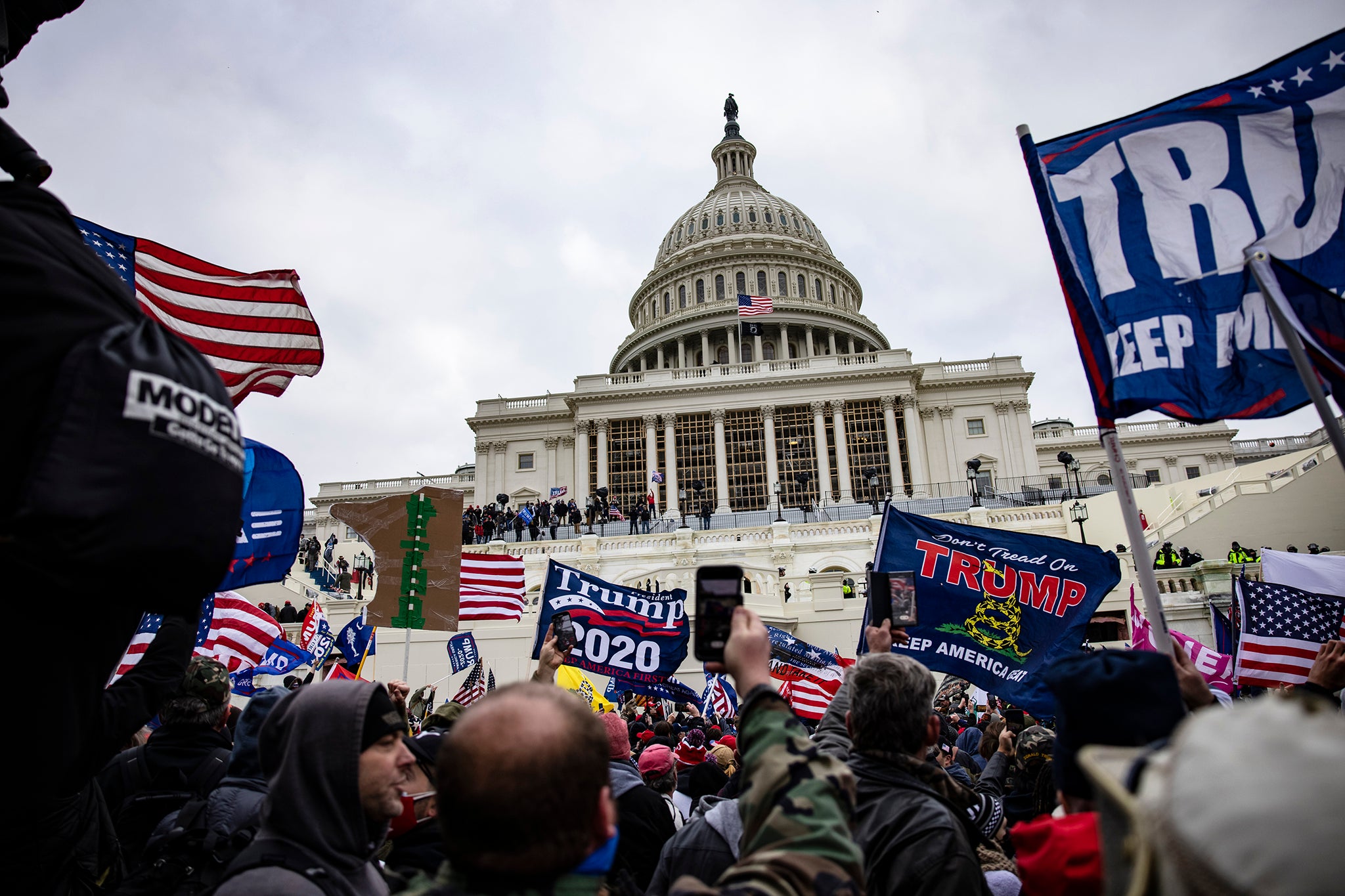The Supreme Court case that could give Jan 6 rioters – and Donald Trump – a break
A Jan 6 rioter, charged with obstructing an official proceeding, is arguing the government unfairly used a white-collar crime law to prosecute him and others
Your support helps us to tell the story
From reproductive rights to climate change to Big Tech, The Independent is on the ground when the story is developing. Whether it's investigating the financials of Elon Musk's pro-Trump PAC or producing our latest documentary, 'The A Word', which shines a light on the American women fighting for reproductive rights, we know how important it is to parse out the facts from the messaging.
At such a critical moment in US history, we need reporters on the ground. Your donation allows us to keep sending journalists to speak to both sides of the story.
The Independent is trusted by Americans across the entire political spectrum. And unlike many other quality news outlets, we choose not to lock Americans out of our reporting and analysis with paywalls. We believe quality journalism should be available to everyone, paid for by those who can afford it.
Your support makes all the difference.Joseph Fischer, a former police officer from Pennsylvania, allegedly entered the US Capitol building on January 6, 2021, yelling “Charge!”, and rushing the police line.
Fischer, like thousands of other rioters that day, attended the “Stop the Steal” rally in support of former president Donald Trump who had spread false claims of election fraud.
Fischer was arrested and charged with several crimes for his actions on January 6. He is among 330 rioters, along with Mr Trump, charged with obstructing an official proceeding.
But Fischer disputes that charge, claiming it is being unfairly used to prosecute him. The white-collar law was enacted 20 years ago in the wake of the Enron financial scandal.
His case, at the hands of the Supreme Court, could call into question the sentencings and convictions against hundreds of rioters and potentially undermine the two federal charges against Mr Trump.
The Supreme Court will hear arguments in Fischer v United States on Tuesday. A decision is expected sometime in or before June.
Four minutes inside the Capitol building
Fischer claims that he and a companion went to the “Stop the Steal” rally and left once it was finished. However, they ultimately made the decision to turn around and join the mob breaching the Capitol building.
Fischer went to the Capitol and pushed his way through the crowd, entering the building at 3.25pm. At that point, he claims, Congress had already recessed after their certification vote. The Trump supporter also claimed that he became caught up in a crowd for four minutes, and was knocked over. He alleged he was polite to police officers, and in return was pepper-sprayed.
But the government tells a different story.
Prosecutors say in the days leading up to January 6, Fischer texted his boss insinuating that there could be violence on that day, he could be arrested and his chief might need to post his bond.
He texted another person: “Can’t vote if they can’t breathe... lol” an apparent reference to the lawmakers in the Capitol.

On January 6, the government says Fischer took a cell phone video of himself running through the crowd and yelling, “Charge!” before rushing into the building at 3.25pm.
Once inside, Fischer ran toward the police line and knocked over an officer. He was then pepper-sprayed and forcibly removed from the building four minutes later.
Fischer posted the video on Facebook.
More than a month after the attack on the Capitol, Fischer was arrested by federal law enforcement officials. During his arrest, Fischer said that he had “no regrets” and shouted profanities at the arresting agents.
He was charged with seven counts associated with his actions including obstructing, influencing or impeding any official proceeding.
An Enron scandal-era law turned Capitol rioter charge
The US code that investigators invoked is related to witness, victim or informant tampering, It is a provision of the Sarbanes-Oxley Act, to protect investors and hold corporations accountable. It was passed after the 2001 collapse of the Enron corporation, one of the largest financial fraud cases in US history.
The statute contains two parts. The first prohibits “corruptly” tampering with evidence that could be used in an official proceeding. The second prohibits a person from “otherwise” obstructing, influencing or impeding on an official proceeding.
Much of Fischer’s argument hinges on the word “otherwise”. He claims that he cannot be charged with violating the second part without violating the first part, too. He argues that the first part is specific to tampering with records and documents, and doesn’t apply in his case.

But the government disagrees, saying that Fischer’s intent in obstructing Congress’ certification of the election results satisfies the statute.
The majority of other federal judges overseeing cases of January 6 defendants have broadly interpreted the law so it applies.
Only two federal judges have sided with Fischer’s argument – Judge Carl Nichol, who heard Fischer’s case in a lower court, and Judge Gregory Katsas on the DC appeals court. Both judges were appointed by Mr Trump.
Republican lawmakers, who filed a brief in support of Fischer, said the government’s interpretation of the law is so broadly interpreted it becomes an “extraordinarily serious weapon for selective prosecution against disfavored political conduct”.
How it impacts Trump
Though Mr Trump is not directly involved in this Supreme Court court case a ruling could potentially impact the federal prosecutor Jack Smith’s federal election interference case against the former president.
Mr Trump is also charged under the same provision by federal prosecutors and has raised a similar defence to Fischer.

But the former president’s lawyers have claimed in their immunity appeal – arguing Mr Trump is immune from criminal prosecution in the federal election interference case because his conduct was done under his responsibility as president – that the statute is stretched beyond its “natural meaning” to cover Mr Trump.
However, Mr Smith has argued that Mr Trump’s alleged attempt to install fake electorates during the 2020 election violates the first part of the statute. So whether or not the Supreme Court sides with Fischer, may not matter.

Join our commenting forum
Join thought-provoking conversations, follow other Independent readers and see their replies
Comments